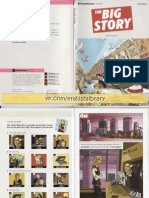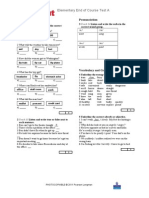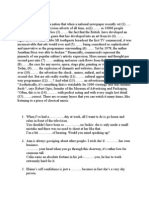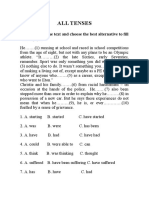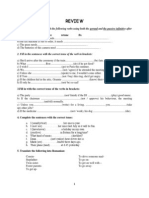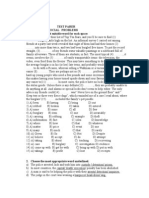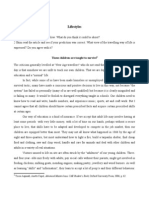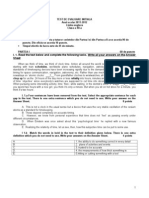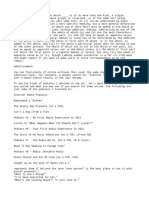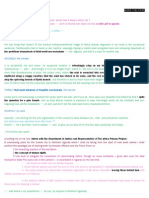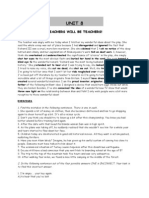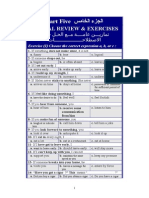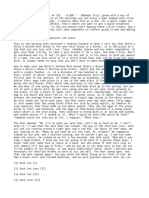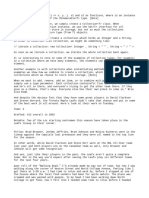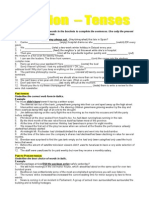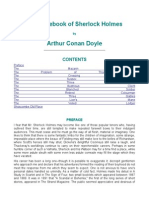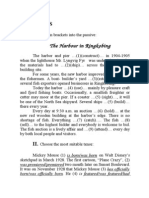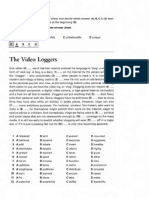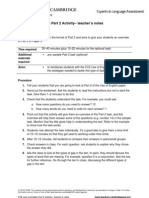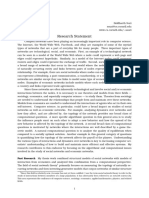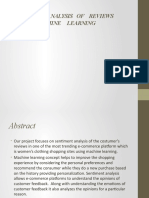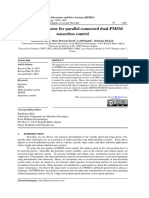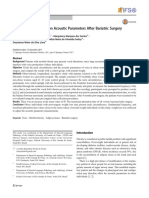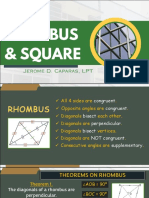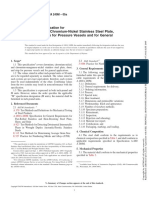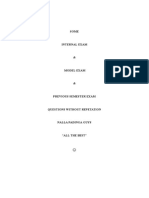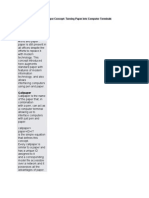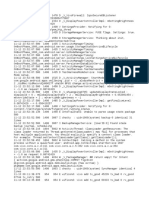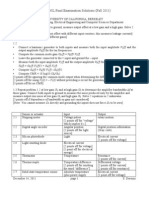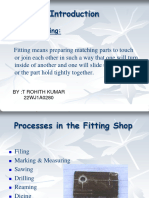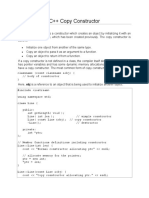All Tenses: I. Read The Text and Choose The Best Alternative To Fill in The Gaps
All Tenses: I. Read The Text and Choose The Best Alternative To Fill in The Gaps
Uploaded by
havisha_24Copyright:
Available Formats
All Tenses: I. Read The Text and Choose The Best Alternative To Fill in The Gaps
All Tenses: I. Read The Text and Choose The Best Alternative To Fill in The Gaps
Uploaded by
havisha_24Original Description:
Original Title
Copyright
Available Formats
Share this document
Did you find this document useful?
Is this content inappropriate?
Copyright:
Available Formats
All Tenses: I. Read The Text and Choose The Best Alternative To Fill in The Gaps
All Tenses: I. Read The Text and Choose The Best Alternative To Fill in The Gaps
Uploaded by
havisha_24Copyright:
Available Formats
ALL TENSES
I. Read the text and choose the best alternative to fill in the gaps: He.(1) running at school and raced in school competitions from the age of eight, but not with any plans to be an Olympic athlete. It( ) the late !i"ties, early !e#enties, remember. !port was only something you did when you. ($) nothing else to do. It wasn%t something you(&) thin' of ma'ing a li#ing out of, e"cept maybe as a () teacher. I don%t 'now of anyone who..(*) as a career, e"cept perhaps 'ids who went to )ton.+ ,hristie and his family..(-) from racial harassment . on occasion at the hands of the police. He.(/) also been stopped more than once in order to e"plain why he(0) in possession of a new car. 1ut he says these e"periences do not mean that when he(2), he is, or e#er.(13) fuelled by a sense of grie#ance. 1. 4. starting . 4. was $. 4. ha#e &. 4. could *. 4. thin' -. 4. suffered /. 4. has 1. started 1. were 1. had 1. were able to 1. was thin'ing ,. ha#e started ,. has been ,. ha#e had ,. can ,. thought
1. ha#e been suffering ,. ha#e suffered 1. ha#e ,. had
0. 4 will be
1. is
,. was ,. runs ,. has been ith the ords given in the
2. 4 is running 1. has run 13. 4 is 1. was
II. Complete the follo ing lines box:
send! learn! do! attend! or"! drop! tr#st! s#rvive! achieve! cope Oli#er 5ilmore is 6ust such a pupil. He is particularly luc'y. His school..(1) on ad#enture camp twice a year. He..( ) three scout camps each year with ad#enture acti#ities. He..($) e#en more ad#enture s'ills as a #oluntary trainee soldier. 7ost wee'ends+, says Oli#er, I%m off..(&) something. It%s great camping and canoeing and doing rope wor' in cliffs8 It%s the(*) together, we ha#e to..(-) one another. 9herefore, it%s us that .(/) it, not 6ust me. I%#e learned to..(0) :ou could ..(2) me in the mountains, with my 'it, and I%d be able to(13) really well.+ III. $nderline the most s#itable verb form: 1. He had been;was upset because he had lost his wallet. . 5hen I arri#ed home 9om has already left; had already left. $. 9hey were ha#ing;had dinner when the lights went off. &. He had been lying on the beach for two hours when his brother arri#ed;was arri#ing. *. 9he tourists left;had left the hotel before we arri#ed.
-. 5hen I opened; was opening the door I found out that the flat has been;had been bro'en into. /. It was late when I arri#ed at the cinema so they didn%t let ;hadn%t let me in. 0. 5hen the house'eeper opened the door, she saw that somebody was;were wal'ing through the hall in muddy shoes. 2. His friends ha#e already finished; had already finished eating when the waiter brought them the refreshments 13. 5hen the ta"i arri#ed we ha#e been waiting;had been waiting for twenty minutes. I%. Rephrase the follo ing sentences so that the& mean the same: e.<. !he hadn%t seen her granny for three years. It was three years since she had seen her granny. 1. I ha#en%t seen him for ages. It%s ages.. . I%#e li#ed here since twenty=fi#e years. How long $. >ulie has #isited ?ome twice this year. How many times &. @ather has read 33 pages up to now. How many. *. He hadn%t phoned her for two wee's. How long -. 5hen did you last ha#e your car repairedA 5hen was. /. 5hile he was cleaning his room my brother spilt the in'. 5hile 0. @irst they had dinner, then watched 9B. 4fter 2. !he has ne#er been gi#en such a nice album.
It%s 13. 4fter he had written his report he went for a wal'. Ha#ing %. '#t the verbs in brac"ets into the correct past forms: I (enter), closed the door behind me at once, (turn) the 'ey I found in the loc' within, and (stand) with the candle (hold) aloftC there it was, the great red room of Dorraine ,astle, in which the young du'e (die). Or, rather, in which he (begin) his dying, for he (open) the door and fallen headlong down the steps I 6ust (ascend). 9hat (be) the end of his #igil, of his gallant attempt to con<uer the ghostly tradition of the place. 4nd there (be) other and older stories that clung to the roomC the tale of a timid wife and the tragic end the tragic end that (come) to her husband%s 6est of frightening her. %I. $se the ord ritten in capitals to form a ord that fits in the space: In the huge new cemetery, some two miles (1)EI!94F,), the old people ( )1G?: their dead, and came bac' to the house steeped in shadow and silence. It was all o#er so <uic'ly that at first they could hardly realise it, and remained in a state of ($) )H(),9 as though of something else to happen. 1ut the days passed, and e"pectation ga#e place to (&) ?)!IIF. It was about a wee' after that the old man, wa'ing (*)!GEE)F in the night, stretched out his hand and found himself alone. 9he room was in (-) E4?J, and the sound of subduet (/)5))( came from the window. He (0) ?4I!) himself in bed and listened. %II. The follo ing lines contain ten grammar and spelling mista"es. Identif& and correct them:
!he 'new nothing of the truth about him, but she seems to understand him, and the only response he e#er gi#en to anything was to her childish sympathy. !he sat and chated to him. He come to recogniKe her step, and would loo'ed up before she entered the room. Once or twice in the e#ening, when the shop were empty, and Fameless was sitting miserably with him, he would as', without lifted his eyesC 5here%s 1ubblesA+ and would be telling that 1ubbles had went to the pictures or is out at a dance. %III. Read the text belo and thin" of the ord hich best fits each space. $se onl& one ord in each space: provide! insist! sa&! be send! re(#ire! anno#nce! need! s itch! s(#ee)e. *ealth Care Next Fow that (resident ,linton%s budget bill ..(1) through the !enate by the narrowest of margins, the legislati#e focus ( ) to health care reform. 9he (resident ..($) his plan in !eptember. If ,linton is to o#erhaul the health care system, he(&) at least some support from moderate ?epublicans. 9his.(*) a change from the first si" months of the ,linton administration, during which the ?epublicans solidly opposed nearly e#ery go#ernment initiati#e. !ome ?epublican leaders (-) signals that they may be willing to wor' with the (resident on health care reform. !enator 1ob Eole, who.(/) one of the most powerful of ,linton%s opponents, (0) that ?epublicans ..(2) no longer = that they would ne#er accept a proposal that all employees be re<uired (13) insurance for their employees.
I+. $nderline,circle the correct form: 5a'e up, 4lice dear8+ said her sister. 5hy, what a long sleep you%#e had;you had had8+ Oh, I%#e had such a curious dream8+ says;sad 4lice. 4nd she told her sister, as well as she can;could remember them, all these strange 4d#entures of hers that you ha#e;had 6ust been reading aboutC and when she ha#e;had finished, her sister 'issed her, and said, It was;has been a curious dream dear, certainlyC but now run into your bedC it%s getting;it was getting late+. !o 4lice got up and run;ran off, thin'ing while she ran, as well as she may;might, what a wonderful dream it has been;had been. +.'#t the verbs in brac"ets into the correct tense: I wal'ed away at a good pace, thin'ing it was easier to go than I (1) (suppose) it ( ) (be), and reflecting that it would ne#er ha#e done to ha#e had an old shoe thrown after a coach, in sight of all the High !treet. I ($) (whistle) and (&) (ma'e) nothing of going. 1ut the #illage (*) (be) #ery peaceful and <uiet, and the light mists solemnly (-) (rise), as if to show me the world, and I (/) (be) so innocent and little there and all beyond was so un'nown and great, that in a moment with a strong hea#e and sob I (0) (brea') into tears. It (2) (be) by the finger=post at the end of the #illage, and I (13) (lay) my hand upon it and said, Iood=bye, my dear, dear friend8+ ,harles Eic'ens . Ireat )"pectations +I. Correct the mista"es in the follo ing sentences: 1. 1y the time she is &3, she will li#e in this town for ten years. . It%s a surprise party and her friends won%t 'now anything about it until they got there.
$. 9he other guests should be arri#ed before us. &. 1y the time we will ha#e finished our wor', e#erybody will ha#e left the office. *. 4t this rate, they will ha#e been e"hausted by the time father arri#es home. -. 1y the time the train came to a standstill, get on and try to find your seats. /. 1y >une she will be li#ing here for fifteen months. 0. 5e were 6ust about lea#ing the house when 4lice called. +II.Choose the most appropriate of the #nderlined ords: 1. He loo's #ery pale. I thin' he%ll faint; he is going to faint. . 7y brother will be; is going to be a famous scientist when he grows up. $. !omebody%s at the door. I%ll; I%m going to see who it is. &. 9hey need to be home early today so they lea#e; are lea#ing at si". *. Our guests will be in plenty of time pro#iding the traffic is not; will not be bad. -. !ue as'ed me if I would; will be so 'ind as to gi#e her a lift. /. 5hat sort of 6ob do you thin' he will do; will be doing in a few years timeA 0. 1y the time our parents get bac' all the food will ha#e gone; will go.L 2. I%ll do; going to do that for you+, she told me. 13. 9he two politicians are to; will discuss the current political affairs.
You might also like
- The Big StoryDocument24 pagesThe Big StoryKaty Recaman100% (3)
- Miller's The Chelsea Affect PDFDocument8 pagesMiller's The Chelsea Affect PDFFabricio ToccoNo ratings yet
- SO E EdCrse TestADocument4 pagesSO E EdCrse TestAValentino Oljaca50% (2)
- Circus of Adventure, The - Enid BlytonDocument86 pagesCircus of Adventure, The - Enid BlytonSam Richards83% (6)
- Notre Dame de Paris LibrettoDocument19 pagesNotre Dame de Paris LibrettoLarissa Klaus100% (1)
- All Tenses: I. Read The Text and Choose The Best Alternative To Fill in The GapsDocument12 pagesAll Tenses: I. Read The Text and Choose The Best Alternative To Fill in The GapsLeonte Știrbu100% (1)
- CPEtestbuilderDocument14 pagesCPEtestbuildermeoluhanh0% (1)
- Roy Gasquet, The Many Benefits of Smaller SchoolsDocument6 pagesRoy Gasquet, The Many Benefits of Smaller SchoolsRaluca IgnaNo ratings yet
- All Tenses: I. Read The Text and Choose The Best Alternative To Fill in The GapsDocument12 pagesAll Tenses: I. Read The Text and Choose The Best Alternative To Fill in The GapsAnca PaduroiuNo ratings yet
- Exercitii Multiple ChoiceDocument16 pagesExercitii Multiple Choicecoco_c78No ratings yet
- Ioana 8Document58 pagesIoana 8Claudia ClaudiaNo ratings yet
- Olimpiada Scolara de Limba Engleza Buzau Clasa A X Aaaaaa: B AreDocument2 pagesOlimpiada Scolara de Limba Engleza Buzau Clasa A X Aaaaaa: B AreAndChrissNo ratings yet
- 0cls A X A Coelegiul TehdniccccDocument2 pages0cls A X A Coelegiul TehdniccccAndChrissNo ratings yet
- Test Paper Social ProblemsDocument10 pagesTest Paper Social ProblemsVlad KlabacsNo ratings yet
- Lifestyles: Tricia Aspinall, Anette Capel, Advanced Masterclasss CAE Student's Book, Oxford University Press, 2006, P. 62Document9 pagesLifestyles: Tricia Aspinall, Anette Capel, Advanced Masterclasss CAE Student's Book, Oxford University Press, 2006, P. 62pusha26No ratings yet
- Anca NogaiDocument4 pagesAnca NogaiLuminita MocanuNo ratings yet
- Taste and Other Tales CortiDocument3 pagesTaste and Other Tales Cortisalome_92fpNo ratings yet
- Mixed Tenses, Conditionals and Unreal TensesDocument7 pagesMixed Tenses, Conditionals and Unreal Tensesali_nusNo ratings yet
- 04 - Streamline English - DestinationsDocument46 pages04 - Streamline English - DestinationsThoLe100% (1)
- English MaterialDocument282 pagesEnglish Materialrush2arthiNo ratings yet
- Rephrasing Separados Varios LevelsDocument36 pagesRephrasing Separados Varios LevelsCristina FNo ratings yet
- XiiDocument5 pagesXiiDiana-Paula MihaiNo ratings yet
- Penguin Books India: Editorial TestDocument10 pagesPenguin Books India: Editorial Testjaytrips9881No ratings yet
- BME Középfokú Nyelvvizsga Feladatsor (2004, 7 Oldal)Document8 pagesBME Középfokú Nyelvvizsga Feladatsor (2004, 7 Oldal)esgabiNo ratings yet
- MU105 Demo 4Document3 pagesMU105 Demo 4Dex YtNo ratings yet
- Simple Present English GrammarDocument5 pagesSimple Present English Grammarneoanderson010No ratings yet
- Week The First FDocument4 pagesWeek The First Fapi-259914914No ratings yet
- Nightmare and Other PoemsDocument42 pagesNightmare and Other PoemsartyfaxNo ratings yet
- Riddles 2Document8 pagesRiddles 2Michelle LiuNo ratings yet
- Unit 08 - Teachers Will Be TeachersDocument4 pagesUnit 08 - Teachers Will Be TeachersMaldicion de la LunaNo ratings yet
- Bus Happenings: by Andrea Isabel Tan ContrerasDocument2 pagesBus Happenings: by Andrea Isabel Tan Contrerasandiscontreras19No ratings yet
- Chem208 Demonstration 3Document8 pagesChem208 Demonstration 3Mark Joeneil SalasNo ratings yet
- The BOX ShortstoryDocument5 pagesThe BOX Shortstorywaqarali78692No ratings yet
- 05 الاصطلاحات الأساسيـة فـي اللغة الإنكليزيةDocument8 pages05 الاصطلاحات الأساسيـة فـي اللغة الإنكليزيةهادي الدهناويNo ratings yet
- Software EvolutionDocument69 pagesSoftware EvolutionmethewthomsonNo ratings yet
- Judet 2012 A VIIIaDocument2 pagesJudet 2012 A VIIIasabina_grapiniNo ratings yet
- Computers!!!: Computer JokesDocument3 pagesComputers!!!: Computer Jokes1AdityaPathania1No ratings yet
- Bob DylanHway 61 RevisitedDocument3 pagesBob DylanHway 61 RevisitedbixgorinNo ratings yet
- Model Subiecte Olimpiada EnglezaDocument7 pagesModel Subiecte Olimpiada EnglezaLiviaMariaNo ratings yet
- PSY333 Study Guide 10Document3 pagesPSY333 Study Guide 10Bop PlaksNo ratings yet
- ENGL311 Research 7Document4 pagesENGL311 Research 7Auni NajwaNo ratings yet
- MATH260 Module 6Document5 pagesMATH260 Module 6Lee SyieraNo ratings yet
- Nume - Prenume - ClasaDocument15 pagesNume - Prenume - ClasadanacreamNo ratings yet
- Aladdin's Wonderful GrammarDocument16 pagesAladdin's Wonderful GrammarhomamunfatNo ratings yet
- Sabahattin Ali EnglishDocument55 pagesSabahattin Ali EnglishSorina ŞtefănescuNo ratings yet
- Ujian Bulanan 1 Bi p1 Y4 2013Document9 pagesUjian Bulanan 1 Bi p1 Y4 2013Azlin ShafinazNo ratings yet
- Tingkat SMP: Test Perlombaan Kecerdasan SiswaDocument5 pagesTingkat SMP: Test Perlombaan Kecerdasan SiswaDede JuandaNo ratings yet
- The Tempest Full ScriptDocument64 pagesThe Tempest Full ScriptAminarashid1No ratings yet
- Word Formation 400Document14 pagesWord Formation 400api-253308435No ratings yet
- URBN278 Powerpoint 5Document4 pagesURBN278 Powerpoint 5Joshua DelgadoNo ratings yet
- TensesDocument3 pagesTensesdomnica04No ratings yet
- FIN1990 Topic 733Document16 pagesFIN1990 Topic 733Glecy AdrianoNo ratings yet
- Speech Time, Whereas Present Continuous Expresses An Action That Takes Places Right As We Speak. ThisDocument4 pagesSpeech Time, Whereas Present Continuous Expresses An Action That Takes Places Right As We Speak. ThisAna-Maria GuguNo ratings yet
- EE265 Final 1Document4 pagesEE265 Final 1dddNo ratings yet
- Casebook of S HolmesDocument146 pagesCasebook of S HolmesoktaviannNo ratings yet
- Proces Verbal AutoDocument1 pageProces Verbal Autohavisha_24No ratings yet
- A Collection of Beautiful Phrasal Verbs 1 PDFDocument2 pagesA Collection of Beautiful Phrasal Verbs 1 PDFhavisha_24No ratings yet
- Exercises I.: The Harbour in RingkobingDocument9 pagesExercises I.: The Harbour in Ringkobinghavisha_24No ratings yet
- Banned CMR enDocument10 pagesBanned CMR enhavisha_24No ratings yet
- Coduri Bancare BICDocument1 pageCoduri Bancare BIChavisha_24No ratings yet
- 0past Tense Simple Present Perfect Simple and ContinuousDocument4 pages0past Tense Simple Present Perfect Simple and Continuoushavisha_24No ratings yet
- CAE Test 8 Use of EnglishDocument5 pagesCAE Test 8 Use of Englishhavisha_24No ratings yet
- Fce Use of English Part 2Document4 pagesFce Use of English Part 2marhulNo ratings yet
- 03a EvaporationDocument39 pages03a EvaporationAgustino WaitihacheNo ratings yet
- Sid Suri RSDocument5 pagesSid Suri RSfx_ww2001No ratings yet
- Tugas Biostatistik Yuliana Y WelikinDocument8 pagesTugas Biostatistik Yuliana Y WelikinHuliaNo ratings yet
- Sentiment Analysis of Reviews Using Machine LearningDocument33 pagesSentiment Analysis of Reviews Using Machine LearningIsha SinghNo ratings yet
- Crippa CA945 Drive FaultsDocument57 pagesCrippa CA945 Drive Faultsnestor gonzalez de leonNo ratings yet
- 2CDS213001R0324Document2 pages2CDS213001R0324Julio César Elías RiveraNo ratings yet
- Real Time Emulator For Parallel Connected dual-PMSM Sensorless ControlDocument15 pagesReal Time Emulator For Parallel Connected dual-PMSM Sensorless ControlInternational Journal of Power Electronics and Drive SystemsNo ratings yet
- Effects of Weight Loss On Acoustic Parameters After Bariatric Surgery PDFDocument5 pagesEffects of Weight Loss On Acoustic Parameters After Bariatric Surgery PDFTony Miguel Saba SabaNo ratings yet
- Nist Ncstar 1-2 - NorestrictionDocument462 pagesNist Ncstar 1-2 - NorestrictionDavid PetersNo ratings yet
- Blood & Body Fluid Tortora 15TH EditionDocument20 pagesBlood & Body Fluid Tortora 15TH Edition334scisyb2020rishabhsingalNo ratings yet
- Rhombus SquareDocument17 pagesRhombus SquareAltheus Miguel Dela CruzNo ratings yet
- (Download PDF) Acquisition of Complex Arithmetic Skills and Higher Order Mathematics Concepts Volume 3 Mathematical Cognition and Learning 1St Edition David C Geary Online Ebook All Chapter PDFDocument43 pages(Download PDF) Acquisition of Complex Arithmetic Skills and Higher Order Mathematics Concepts Volume 3 Mathematical Cognition and Learning 1St Edition David C Geary Online Ebook All Chapter PDFvera.wright162100% (17)
- Api Microservice PDFDocument3 pagesApi Microservice PDFgaribmanushNo ratings yet
- GEZE Installation Instructions en 630924Document8 pagesGEZE Installation Instructions en 630924PiotrNo ratings yet
- Barriga VerdeDocument10 pagesBarriga Verdeami neNo ratings yet
- ASTM A240-A240M-05aDocument12 pagesASTM A240-A240M-05aNadhiraNo ratings yet
- JAVA ProgrammingDocument66 pagesJAVA Programming20BCC64 Aruni JoneNo ratings yet
- The Callpaper Concept: Turning Paper Into Computer TerminalsDocument4 pagesThe Callpaper Concept: Turning Paper Into Computer TerminalsSai Charan GoudNo ratings yet
- Mora Et Al 2011 How Many SPP Are There On Earth & Ocean PDFDocument8 pagesMora Et Al 2011 How Many SPP Are There On Earth & Ocean PDFGustavo Ordoñez VazquezNo ratings yet
- Evaporator SimulationDocument20 pagesEvaporator SimulationRaihan HaidarNo ratings yet
- LogDocument30 pagesLogNiken RRangganisNo ratings yet
- Connect To VPN Gate by Using SoftEther VPN (SSL-VPN) PDFDocument4 pagesConnect To VPN Gate by Using SoftEther VPN (SSL-VPN) PDFpedro abarcaNo ratings yet
- EECS 145L Final Examination Solutions (Fall 2011)Document8 pagesEECS 145L Final Examination Solutions (Fall 2011)muhamadkamalaminNo ratings yet
- 1 Test & MeasurementDocument14 pages1 Test & MeasurementFrancis Oso Pantino100% (2)
- EG2000 Manual 1Document620 pagesEG2000 Manual 1mayphatbaoson_512242No ratings yet
- An Empirical Review of Research Methodologies and Methods in Creativity StudiesDocument13 pagesAn Empirical Review of Research Methodologies and Methods in Creativity StudiesMBNo ratings yet
- Organizational Attractiveness - An Interactionist PerspectiveDocument10 pagesOrganizational Attractiveness - An Interactionist Perspectivele phu cuongNo ratings yet
- What Is Fitting Workshop Practice PresenDocument35 pagesWhat Is Fitting Workshop Practice Presen22wj1a0280No ratings yet
- C++ Copy ConstructorDocument4 pagesC++ Copy ConstructorAnshu RajputNo ratings yet
- P - 43 F.P.S.O Conversion Inspection and Test Plan Matrix: Doc. No. 218338-Q-PA-020 Doc Title: Rev. A 7 of 20Document50 pagesP - 43 F.P.S.O Conversion Inspection and Test Plan Matrix: Doc. No. 218338-Q-PA-020 Doc Title: Rev. A 7 of 20Budi TooleeNo ratings yet
